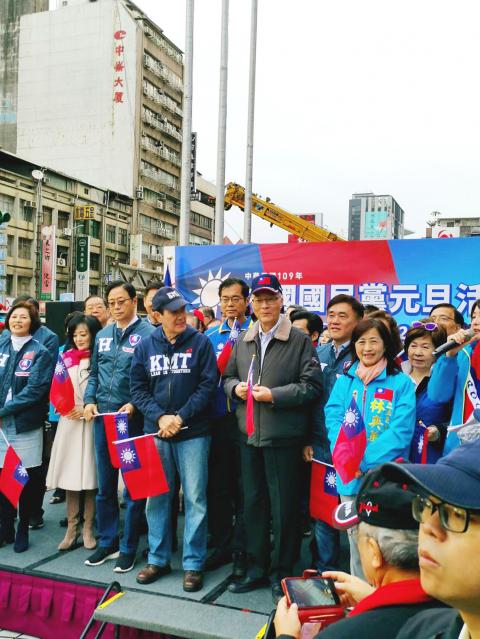Kaohsiung Mayor Han Kuo-yu (韓國瑜) yesterday vowed to review the newly passed Anti-infiltration Act (反滲透法) if he is elected president and the Chinese Nationalist Party (KMT) regains control of the Legislative Yuan.
The act is “a bad law” that would cause fear among the public once in effect, the KMT presidential candidate told reporters in Tainan.
“If I am elected president and the KMT regains a majority in the legislature, we would definitely review the act to ensure that Taiwanese can live without fear,” Han said.

Photo: Shih Hsiao-kuang, Taipei Times
The passage of the act on Tuesday by the Democratic Progressive Party (DPP)-controlled legislature is an example of the “tyranny of the majority,” he said.
When the DPP was a minority party in the legislature, it often criticized the KMT using its legislative majority to push through bills, he added.
“Now we see the DPP doing the same thing, only in a worse manner: The act passed a first reading without undergoing an initial review and the Executive Yuan did not even offer an alternative version,” Han said.
“What is most unbelievable is that President [Tsai Ing-wen (蔡英文)] directly ordered its passage,” he said, adding that the way the act was passed was unacceptable to the public.
Earlier at a flag-raising ceremony in Tainan, Han compared the passage of the act to tying a bomb to people’s necks, saying that it allows the DPP to “blow up” anyone it chooses.
“The DPP must think clearly — do you want people to vote for you because they love you, or vote for you because they fear you?” Han said.
Separately yesterday, former premier Simon Chang (張善政), Han’s running mate, said at a flag-raising ceremony at KMT headquarters in Taipei that the passage of the act was “the darkest day in the history of the Republic of China since its democratization.”
The act’s passage went against the will of the Taiwanese public, he said, adding that most look forward to seeing it reviewed.
Former president Ma Ying-jeou (馬英九), who was also at the event, said: “The passage of the Anti-infiltration Act means the return of the Martial Law period.”
Last month, National Taiwan University professor Su Hung-dah (蘇宏達) was summoned for questioning by police after criticizing the National Palace Museum’s renovation plan in a video he posted on Facebook, Ma said.
As a frequent critic of the act, “I might be next [to be summoned for questioning], but I am not scared, because the Anti-infiltration Act is unconstitutional,” he added.
The Mainland Affairs Council said that the passage of the act was both necessary and in line with public expectations.
It aims to protect national security, social order and Taiwan’s democracy from external threats, the council said, adding that similar legislation has been passed in the US, Germany, Canada, Australia and New Zealand.
The act only punishes people who make political donations, lobby for a political cause, campaign for a political candidate, upset social order or spread disinformation to influence elections under the instruction or sponsorship of a foreign government or organization, it said.
Businesspeople, academics and students engaging in normal cross-strait exchanges would not be affected, it added.
Additional reporting by Chung Li-hua and Lai Hsiao-tung

Taiwan is stepping up plans to create self-sufficient supply chains for combat drones and increase foreign orders from the US to counter China’s numerical superiority, a defense official said on Saturday. Commenting on condition of anonymity, the official said the nation’s armed forces are in agreement with US Admiral Samuel Paparo’s assessment that Taiwan’s military must be prepared to turn the nation’s waters into a “hellscape” for the Chinese People’s Liberation Army (PLA). Paparo, the commander of the US Indo-Pacific Command, reiterated the concept during a Congressional hearing in Washington on Wednesday. He first coined the term in a security conference last

Prosecutors today declined to say who was questioned regarding alleged forgery on petitions to recall Democratic Progressive Party (DPP) legislators, after Chinese-language media earlier reported that members of the Chinese Nationalist Party (KMT) Youth League were brought in for questioning. The Ministry of Justice Investigation Bureau confirmed that two people had been questioned, but did not disclose any further information about the ongoing investigation. KMT Youth League members Lee Hsiao-liang (李孝亮) and Liu Szu-yin (劉思吟) — who are leading the effort to recall DPP caucus chief executive Rosalia Wu (吳思瑤) and Legislator Wu Pei-yi (吳沛憶) — both posted on Facebook saying: “I

Sung Chien-liang (宋建樑), who led efforts to recall Democratic Progressive Party (DPP) Legislator Lee Kun-cheng (李坤城), was released on bail of NT$80,000 today amid outcry over his decision to wear a Nazi armband to questioning the night before. Sung arrived at the New Taipei District Prosecutors’ Office for questioning in a recall petition forgery case last night wearing a red armband bearing a swastika, carrying a copy of Adolf Hitler’s Mein Kampf and giving a Nazi salute. Sung left the building at 1:15am without the armband and covering the book with his coat. Lee said today that this is a serious

Firefighters are working to put out a fire on Taipei’s Yangmingshan (陽明山) reported earlier this morning. The cause of the fire is still under investigation. The Taipei Fire Department said it received a report of a fire at Xiaoyoukeng (小油坑) at 11:17am, dispatching four command vehicles, 16 firetrucks, one ambulance and 72 personnel. The fire is still burning on about 250m² of land, according to initial estimates, as eyewitnesses reported seeing smoke rising from the mountain. The Yangmingshan National Park Headquarters on Facebook said the Qixingshan (七星山) hiking trail starting from Xiaoyoukeng and the Xiaoyoukeng parking lot are closed as firefighters work to put